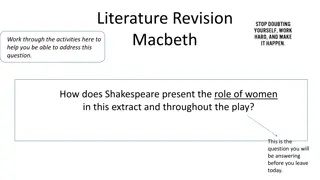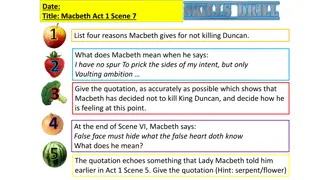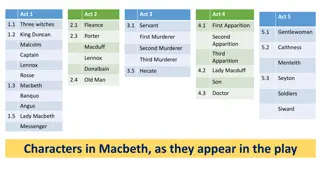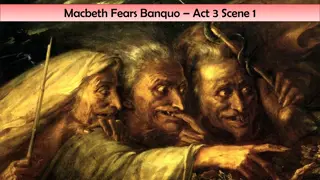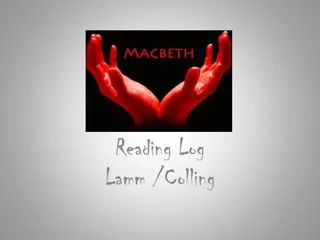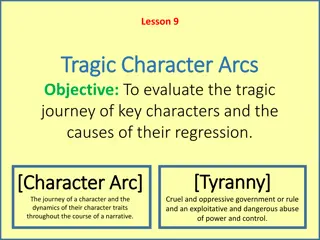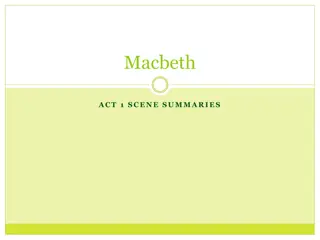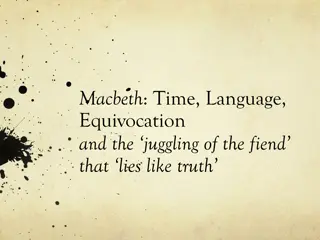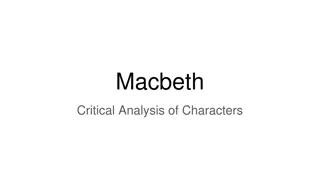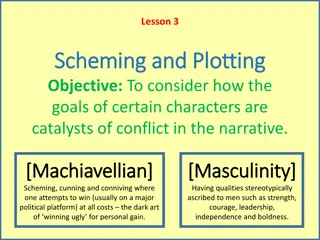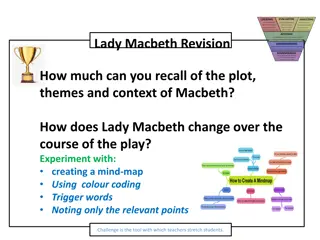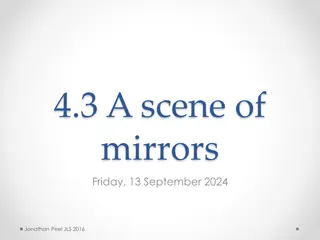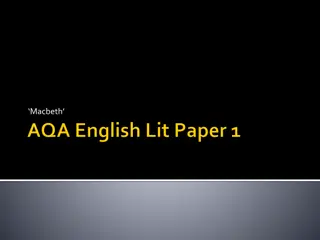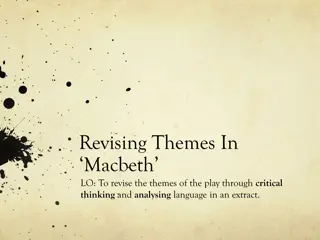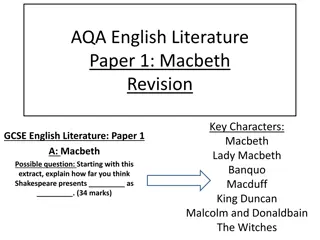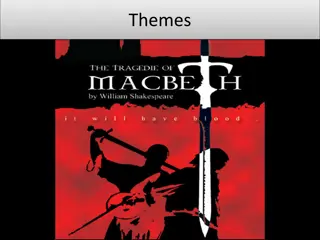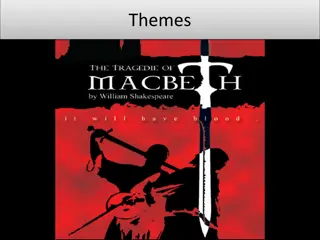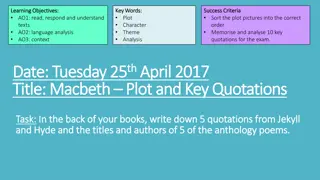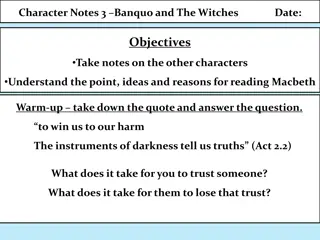Macbeth Revision: Plot, Themes, and Context Exploration
Explore the key ideas, characters, and events in Shakespeare's Macbeth through an in-depth analysis of plot, context, themes, and the playwright's intent. Delve into the tragic hero concept, dramatic irony, and the portrayal of power dynamics, supported by key quotes and historical context.
Download Presentation

Please find below an Image/Link to download the presentation.
The content on the website is provided AS IS for your information and personal use only. It may not be sold, licensed, or shared on other websites without obtaining consent from the author. Download presentation by click this link. If you encounter any issues during the download, it is possible that the publisher has removed the file from their server.
E N D
Presentation Transcript
28th January 2019 Stretch and Challenge for All Macbeth Revision How much can you recall of Macbeth? Plot and/or Shakespeare s intent and impact on audience Context themes Key quotes Challenge is the tool with which teachers stretch students.
28th January 2019 Macbeth William Shakespeare Learning Objectives: To review the key ideas, events and characters of Macbeth . Explore how Macbeth is presented by Shakespeare. AO1 Select a range of quotations/language devices to support their response. AO2 Use contextual knowledge to analyse how Macbeth changes over the course of the play. AO3 Main themes of the play: Appearance Vs Reality Divine Right of Kings Murder Blood Loss of sleep The Supernatural The role of women Keywords: Tragic Hero Dramatic Irony Soliloquy Aside Context
GCSE English Literature - Paper 1: Shakespeare and the 19th Century Novel Section A Macbeth AO1: Clear explained response to task and Macbeth text. Effective use of references from the play to support explanation. Clear writing and well selected quotations AO2: Clear explanation of Shakespeare s methods/techniques. Understanding of effects of Shakespeare s methods/techniques on the audience. Do you understand how dramatic irony/stage directions/Soliloquy/Asides are used? AO3: Clear understanding of ideas/perspectives/contextual factors shown by specific links between Jacobean era/Macbeth text and the task. Context of the play AO4: Learners spell and punctuate with consistent accuracy, and consistently use vocabulary and sentence structures to achieve control of meaning. SPaG
Some will be able to use contextual knowledge to analyse how Macbeth changes over the course of the play. AO3 Macbeth is a play that celebrates the Scottish heritage of King James 1st of England (King James 6th of Scotland). It also appeals to his interests in Witchcraft and the Supernatural. Belief in Witchcraft was widespread in Shakespeare s era. King James 1st wrote a book called Demonology in 1597 as he believed that he had been the victim of witches. Witchcraft or associating with witches was made a capital offence in 1604. It was written in 1606 but set in 11th Century Scotland. in England between the Catholics and the Protestants. A group of Catholic conspirators planned to blow up the Houses of Parliament with King James inside. Guy Fawkes was left in charge of the explosives; 36 barrels of gunpowder. However, he was caught and the assassination attempt failed. Guy Fawkes was ordered to be hanged, drawn and quartered. Therefore, the play is a warning against committing treason that there will be severe consequences for those that try to go against the monarchy. November 5th 1605 The Gunpowder Plot. There was religious tension full houses when performed in theatres across the country. Also known as The Scottish Play due to its setting. One of Shakespeare s most famous tragedies; drew hierarchy. In this play, it is the women who are the most powerful. This was a very religious and Christian Society C17th. Men were considered to be the highest in the social
Key terms relating to Macbeth Tragic Hero: What are the characteristics? Loved, Respected and Honoured at the start. A flaw (hamartia) that leads to the character s demise. The hero becomes tragic because they have to die for their sins. Divine Right of Kings: What does this mean? The belief that the King was God s representative on Earth. The title passed from father to son within one royal lineage. Breaking the divine right was considered a blasphemous act punishable by death Killing a king is call regicide (a crime) Soliloquy? When a character speaks their thoughts and feelings aloud for the benefit of the audience. Alone on the stage. Aside? When a character speaks their thoughts and feelings aloud for the benefit of the audience. Other characters are present on stage they either freeze or pretend to have a conversation in the background.
All will be able to explain how Macbeth is presented by Shakespeare. AO1 Most will be able to select a range of quotations/language devices to support their response. AO2 Some will be able to use contextual knowledge to analyse how Macbeth changes over the course of the play. AO3 Links to context? Divine Right of Kings breaking of the natural order? Symbolism? Religious references? Macbeth as a murderer Guilty? Paranoid? Fearful? Theme blood/loss of sleep Macbeth as a tragic hero what is his flaw? Theme - Appearance versus Reality Influence of the supernatural on Macbeth? Visions and hallucinations? Question: How is Macbeth presented by Shakespeare Key Macbeth as a brave warrior? Quotations? How do we know that Macbeth s destiny is linked to the witches? How would a Shakespearean audience react to Macbeth? Use of Soliloquy? Asides? Dramatic Irony? Rhyming couplets?
Most will be able to select a range of quotations/language devices to support their response. AO2 What do the following Key Quotations mean or suggest about Macbeth? 1. Bellona s bridegroom 2. (Aside) My thought, whose murder yet is but fantastical, shakes so my single state of man. 3. Stars hide your fires! Let not light see my black and deep desires 4. Yet I do fear thy nature, it is too full o th milk of human kindness to catch the nearest way. 5. I have no spur to prick the sides of my intent, but only vaulting ambition, which o erleaps itself and falls on th other 6. Glamis hath murdered sleep and therefore Cawdor shall sleep no more, Macbeth shall sleep no more! 7. Will all Great Neptune s ocean wash this blood clean from my hand? - 8. For Banquo s issue have I fil dmy mind; for them the gracious Duncan have I murdered. 9. Thou canst not say I did it: never shake thy gory locks at me! 10. The castle of Macduff I will surprise; Seize upon Fife; give to th edge o th sword his wife, his babes and all unfortunate souls that trace him in his line -
1. Bellonas bridegroom Bellona was the Roman Goddess of War. Macbeth is so brave and fierce in war that he looks like her husband. 2. (Aside) My thought, whose murder yet is but fantastical, shakes so my single state of man. In Act 1 Scene 3, Macbeth has thoughts of murdering King Duncan so that he can fulfil the third prophecy. However, his thoughts scare him and he dismisses them straightaway. Where have these thoughts come from all of a sudden? Remember that at this point, he is still considered to be an honourable man. 3. Stars hide your fires! Let not light see my black and deep desires In Act 1 Scene 4, Malcolm is officially declared as the next heir to the throne. Macbeth sees him as an obstacle to his ambitions and wants the stars to stop shining so that his dark desires can be hidden. 4. Yet I do fear thy nature, it is too full o th milk of human kindness to catch the nearest way. Lady Macbeth says this about Macbeth in her first soliloquy. She feels that he is too soft and kind in order to fulfil his ambitions. 5. I have no spur to prick the sides of my intent, but only vaulting ambition, which o erleaps itself and falls on th other This is from the end of Macbeth s first soliloquy in Act 1 scene 7; he says that he is simply ambitious and does not want to kill the King in order to become King.
6. Glamis hath murdered sleep and therefore Cawdor shall sleep no more, Macbeth shall sleep no more! Macbeth returns from killing King Duncan and feels completely guilty. He feels that he will now lead a restless life in which he will never sleep again one of the themes of the play is a lack of sleep. 7. Will all Great Neptune s ocean wash this blood clean from my hand? He can wash the blood away physically but not mentally. He feels that even a whole ocean s worth of water will not be able to wash the blood from his hands. Metaphorically shows that the guilt of this murder will never leave him. 8. For Banquo s issue have I fil d my mind; for them the gracious Duncan have I murdered. After the murder of Duncan, Macbeth feels frustrated that he has no sons of his own to succeed him. He feels that he has killed the rightful King Duncan as an advantage to Banquo whose sons are destined to be King. 9. Thou canst not say I did it: never shake thy gory locks at me! At the Coronation Banquet in Act 3 scene 4, Macbeth sees Banquo s ghost in his seat. He is so horrified by the ghost that he screams at it, asking it not to shake its blood covered hair and declaring that he cannot be blamed for the murder! 10. The castle of Macduff I will surprise; Seize upon Fife; give to th edge o th sword his wife, his babes and all unfortunate souls that trace him in his line When he is given the apparition to Beware Macduff , he decides to have all of Macduff s family killed.
Most will be able to select a range of quotations/language devices to support their response. AO2 Macbeth s Asides and Soliloquies show the changes in his character the most. Asides: Act 1 Scene 3 Macbeth has been told his prophecies by the witches and he automatically thinks about killing the King. He dismisses these thoughts as he is still honourable at this moment. MACBETH (aside) Glamis, and thane of Cawdor! The greatest is behind. MACBETH (to himself) It s just like they said now I m the thane of Glamis and the thane of Cawdor. And the best part of what they predicted is still to come. MACBETH (aside) Two truths are told, As happy prologues to the swelling act Of the imperial theme. MACBETH (to himself) So far the witches have told me two things that came true, so it seems like this will culminate in my becoming king. MACBETH (aside) This supernatural soliciting Cannot be ill, cannot be good. If ill, Why hath it given me earnest of success, Commencing in a truth? I am thane of Cawdor. If good, why do I yield to that suggestion Whose horrid image doth unfix my hair And make my seated heart knock at my ribs, Against the use of nature? Present fears Are less than horrible imaginings. MACBETH (to himself) This supernatural temptation doesn t seem like it can be a bad thing, but it can t be good either. If it s a bad thing, why was I promised a promotion that turned out to be true? Now I m the thane of Cawdor, just like they said I would be. But if this is a good thing, why do I find myself thinking about murdering King Duncan, a thought so horrifying that it makes my hair stand on end and my heart pound inside my chest? The dangers that actually threaten me here and now frighten me less than the horrible things I m imagining.
Act 1 Scene 3 continued: MACBETH (aside) Even though it s just a fantasy so far, the mere thought of committing murder shakes me up so much that I hardly know who I am anymore. My ability to act is stifled by my thoughts and speculations, and the only things that matter to me are things that don t really exist. My thought, whose murder yet is but fantastical, Shakes so my single state of man That function is smothered in surmise, And nothing is but what is not. MACBETH(aside) Come what come may, Time and the hour runs through the roughest day. MACBETH(to himself) One way or another, what s going to happen is going to happen. QUESTION: What does the audience learn about Macbeth s thoughts and feelings in this scene from his asides?
Act 1 Scene 4 Malcolm has been announced as the next official heir to the throne; he is given the title of Prince of Cumberland. His asides here reveal that he perceives Malcolm to be an obstacle that he needs to overleap . MACBETH(aside) MACBETH(to himself) The prince of Cumberland! That is a step On which I must fall down, or else o'erleap, For in my way it lies. Stars, hide your fires; Let not light see my black and deep desires. The eye wink at the hand, yet let that be Which the eye fears, when it is done, to see. Malcolm is now the prince of Cumberland! To become king myself, I m either going to have to step over him or give up, because he s in my way. Stars, hide your light so no one can see the terrible desires within me. I won t let my eye look at what my hand is doing, but in the end I m still going to do that thing I d be horrified to see. Keep the light imagery in mind this is repeated a number of times throughout the play. For example, when Macbeth kills the King and Scotland suddenly becomes dark the sunlight is described as if it has been taken over by darkness. It is symbolic of when Jesus died and an eclipse caused darkness to fall across the land. Good has been overthrown by evil.
Macbeths Soliloquies: Act I Scene 7 - Macbeth s better judgement seems to prevail and he realises the foolishness of murdering the virtuous King Duncan. Lady Macbeth s arrival just as he finishes is a key moment in the plot. Act 2 Scene 1 - A dagger points the way to Duncan s chamber. Macbeth is intent on murder, his mind is made up. His moral sense has become corrupted. Act 3 Scene 1 - Though acknowledging the immorality of what has happened, Macbeth now determines to shape his future and challenge fate. Banquo must die. The tyrant in him is emerging. Act 4 Scene 1 - In the immediate aftermath of his second encounter with the witches, Macbeth feels he must act impulsively from this point on and the first to suffer will be Macduff s family. Act 5 Scene 3 - The emptiness of Macbeth s life is the subject of this speech. He has thrown away his soul for nothing. . Act 5 Scene 5 - Lady Macbeth s piercing death cry does not startle Macbeth. He is numbed and has lost all human feeling.
General points to note about Macbeths character: Macbeth is the General of the Scottish army. He is also the Thane of Glamis and Cawdor. The King loves him but Macbeth is still not happy. He overreaches due to the flaw in his personality. He goes from being an honourable man to a tyrant King who rules through fear. Scotland is described as being a grave when he becomes King as it is described as if it is bleeding there are suggestions that children are becoming orphans and women are becoming widows in his reign. Fear and Paranoia cause him to commit countless murders of innocent people. Every time he feels threatened, he orders a murder; the King s bodyguards, Banquo, Macduff s family etc. Macbeth s flaw/hamartia is his ambition. He becomes a tragic hero that is driven by his ambition. Macbeth becomes more isolated from everyone as the play goes on. In Act 3, he tells Lady Macbeth be innocent of the knowledge dearest chuck He stops telling her about his murderous plans as he doesn t need her anymore. The Macbeths switch roles after Act 3. Macbeth becomes mentally strong and manipulative whereas Lady Macbeth starts to break down mentally.
After Act 3, the relationship between the Macbeths becomes more distant. They do not appear together in the play again which suggests a breakdown in the relationship and the fact that Macbeth is isolating himself even from his dearest partner of greatness. His continued visions and hallucinations continue throughout the play and show the signs of a guilty and troubled mind. He is deceived in Act 4 Scene 1 by the witches apparitions; they lead him to believe that he is invincible as he fully believes that everyone is born of a woman and that the woods cannot uproot themselves and move. He doesn t consider the concept of people being born via a Caesarean Section and trees being used as camouflage. Macbeth s character represents the theme of Appearance Vs Reality as he is completely different to how the audience initially perceive him to be. Also falls victim to his wife s famous quotation to look like the innocent flower but be the serpent under t. Although he dies as a tyrant, he is still a brave soldier and dies fighting. He fights to the death at the end.
Quiz: 1) When was the play written and set? 2) Why was the play written? Think of the context of the play. 3) In which scene does Macbeth first appear? 4) Who gives Macbeth his prophecies? What are they? 5) Who influences him the most in the play? 6) What is the Divine Right of Kings? 7) How does Macbeth become a tragic hero? 8) Give examples of how the natural order has been broken. 9) What are the main themes of the play? 10) Which apparitions lead Macbeth to believe that he is invincible in Act 4?
Sample Essay: Macbeth as a Tragic Hero The role of a tragic hero is commonplace in many of Shakespeare s works. The character of Macbeth is a classic example of a Shakespearean tragic hero. There are a multitude of factors that contribute to Macbeth being labelled as a tragic hero. Before these factors can be discussed, it is important to understand what workings make up the characteristics of a tragic hero. Typically, a tragic hero is a figure of high stature, often of noble background. This person is predominantly good, but suffers a self-inflicted falling out due to flaws in their personality. The tragic hero has a tremendous downfall, brought about by their hamartia. Finally, a Shakespearean tragic hero will lose their life in the end of the play so the message of what is good in the play can be re-established. In Shakespeare s Macbeth, the title figure of the play can be seen as a tragic hero. Early on in the play, Macbeth is established as being of great stature. He has already earned the title of Thane of Glamis, and as prophesised by the three witches, will soon take reign as the Thane of Cawdor. These titles indicate that Macbeth is of great political importance, and is moving up in the ranks of Scottish nobility. In Act 1, Scene 2, Duncan addresses Macbeth as, valiant cousin, worthy gentleman! and later as a Worthy Thane . The manner in which the leaders of his country speak about Macbeth truly shows his respectable and honourable nature. Duncan speaks highly of Macbeth; unaware of the destiny Macbeth will later impose on him.
Macbeths blind ambition, along with the provoking of his wife, leads him to take a violent and bloody path to the throne. Following the format of a tragic hero, Macbeth suffers from a tragic flaw. He has multiple flaws in character, the most prominent being his vaulting ambition and his impressionability. After the witches told Macbeth about his bright future of nobility in Scotland, his honourable nature seemed to fade, and was soon replaced by a by any means necessary attitude. His lust for power, along with persuasive words from Lady Macbeth, led to him murdering King Duncan in his sleep. Macbeth was crowned King of Scotland, which led to extreme paranoia, fearing anyone with a noble bloodline as a threat to his power. By the end of the play, four deaths can be attributed to Macbeth s name, all murdered in hopes of protecting his kingship. His ambition blinds him from seeing the destructive path he has created, ruling as a tyrant rather than a noble king. His easily impressionable nature causes him to not form his own thoughts, but rather listen to the words of Lady Macbeth and the three witches. These tragic flaws go on to play a major role in Macbeth s demise. Macbeth s tragic flaws lead him to become a tyrant, who is quickly removed from power by the Scottish people. With the bloody path he had made for himself, his fall from power was inevitable. Macbeth s bloody actions ended with him having to fear for his own life, as thousands in Scotland wanted him dead. Macbeth was aware that his evil deeds would lead to people wanting revenge. However, he did not fear these people, as he fell for the deceptive words of the witches. The three witches told him to be bold and fearless, that no man born of a woman could defeat him, and that he will never be defeated until the trees of Great Birnam Wood attack Dunsinane. Macbeth saw both of these things as impossible, so he did little to protect his castle. He was
surprised when he was told that the forest was indeed attacking his castle, which was actually Macduff s army carrying branches as a means of camouflage. His true end came during his battle with Macduff, where Macduff revealed he was not born of woman, rather he was ripped from his mother s womb, implying a Caesarean section. In this moment Macbeth was enlightened about his vulnerability. Macduff goes on to behead Macbeth, ensuring that his own family did not die in vain. With his death, Macbeth solidifies himself as a tragic hero. The audience learns the dangers of ambition, and good is re-established. Macbeth fits every characteristic of a Greek and Shakespearean tragic hero. The audience gets to see the full cycle of a rise to power, followed by a great demise. His ambition leads to his degeneration as a character which resulted in his ultimate downfall, death. Macbeth displays all the characteristics of a tragic hero, making him an infamous character in Shakespeare s time as well as present day.



